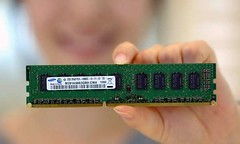
Samsung Electronics today announced that it completed development of the industry's first DDR4 DRAM module last month, using 30 nanometer (nm) class process technology.
"Samsung has been actively supporting the IT industry with our green memory initiative by coming up with eco-friendly, innovative memory products providing higher performance and power efficiency every year," said Dong Soo Jun, president, memory division, Samsung Electronics. "The new DDR4 DRAM will build even greater confidence in our cutting-edge green memory, particularly when we introduce four-gigabit (Gb) DDR4-based products using next generation process technology for mainstream application."
The new DDR4 DRAM module can achieve data transfer rates of 2.133 gigabits per second (Gbps) at 1.2V, compared to 1.35V and 1.5V DDR3 DRAM at an equivalent 30nm-class* process technology, with speeds of up to 1.6Gbps. When applied to a notebook, it reduces power consumption by 40 percent compared to a 1.5V DDR3 module.
The module makes use of Pseudo Open Drain (POD), a new technology that has been adapted to high-performance graphic DRAM to allow DDR4 DRAM to consume just half the electric current of DDR3 when reading and writing data.
By employing new circuit architecture, Samsung's DDR4 will be able to run from 1.6 up to 3.2Gbps, compared to today's typical speeds of 1.6Gbps for DDR3 and 800Mbps for DDR2.
Late last month, Samsung provided 1.2V 2 gigabyte (2GB) DDR4 unbuffered dual in-line memory modules (UDIMM) to a controller maker for testing.
Samsung now plans to work closely with a number of server makers to help insure completion of JEDEC standardization of DDR4 technologies in the second half of this year.
Samsung has been leading the advancement of DRAM technology ever since it developed the industry's first DDR DRAM in 1997. In 2001, it introduced the first DDR2 DRAM, and in 2005, announced the first DDR3 DRAM using 80nm-class technology.

0comments:
Post a Comment